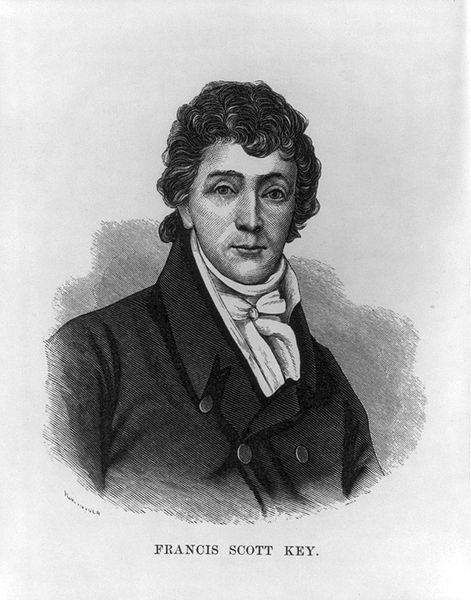<Back to Index>
- Chemist Georg Karl von Hevesy, 1885
- Poet Francis Scott Key, 1779
- Emperor of the Roman Empire Tiberius Claudius Ceasar Augustus Germanicus, 10 B.C.
PAGE SPONSOR

Francis Scott Key (August 1, 1779 – January 11, 1843) was an American lawyer, author, and amateur poet, from Georgetown, who wrote the lyrics to the United States' national anthem, "The Star-Spangled Banner".
Francis Scott Key was born to Ann Phoebe Penn Dagworthy (Charlton) and Captain John Ross Key at the family plantation Terra Rubra in what was Frederick County and is now Carroll County, Maryland. His father John Ross Key was a lawyer, a judge and an officer in the Continental Army. His great-grandparents were Philip Key and Susanna Barton Gardiner, both born in London, England, immigrated to Maryland in 1726.
He studied law at St. John's College, Annapolis, Maryland, and also learned under his uncle Philip Barton Key. During the War of 1812, Key, accompanied by the American Prisoner Exchange Agent Colonel John Stuart Skinner, dined aboard the British ship HMS Tonnant, as the guests of three British officers: Vice Admiral Alexander Cochrane, Rear Admiral Sir George Cockburn, and Major General Robert Ross. Skinner and Key were there to negotiate the release of prisoners, one being Dr. William Beanes. Beanes was a resident of Upper Marlboro, Maryland, and
had been captured by the British after he placed rowdy stragglers under
citizen's arrest with a group of men. Skinner, Key, and Beanes were not
allowed to return to their own sloop: they had become familiar with the strength and position of the British
units and with the British intent to attack Baltimore. As a result of
this, Key was unable to do anything but watch the bombarding of the
American forces at Fort McHenry during the Battle of Baltimore on the night of September 13 – September 14, 1814. When the smoke cleared, Key was able to see an American flag still
waving and reported this to the prisoners below deck. On the way back
to Baltimore, he was inspired to write a poem describing his
experience, "The Defence of Fort McHenry", which he published in the Patriot on September 20, 1814. He intended to fit the rhythms of composer John Stafford Smith's "To Anacreon in Heaven". It has become better known as "The Star Spangled Banner". Under this name, the song was adopted as the American national anthem, first by an Executive Order from President Woodrow Wilson in
1916 (which had little effect beyond requiring military bands to play
it) and then by a Congressional resolution in 1931, signed by President Herbert Hoover. In the fourth stanza Key urged the adoption of "In God is our Trust" as the national motto. The United States adopted the motto "In God We Trust" by law in 1956. From 1817 until his death in 1843, Key served as a Vice President of the American Bible Society. In 1832, Key served as the attorney for Sam Houston during his trial in the U.S. House of Representatives for assaulting another Congressman. He published a prose work called The Power of Literature, and Its Connection with Religion in 1834. In 1835, Key prosecuted Richard Lawrence for his unsuccessful attempt to assassinate President of the United States Andrew Jackson. In 1843, Key died at the home of his daughter Elizabeth Howard in Baltimore from pleurisy and was initially interred in Old Saint Paul's Cemetery in the vault of John Eager Howard. In 1866, his body was moved to his family plot in Frederick at Mount Olivet Cemetery. Though Key had written poetry from time to time, often with heavily
religious themes, these works were not collected and published until 14
years after his death. The
Key Monument Association erected a memorial in 1898 and the remains of
both Francis Scott Key and his wife were placed in a crypt in the base
of the monument. In 1861, Key's grandson Francis Key Howard, was imprisoned in Fort McHenry with the Mayor of Baltimore, George William Brown, and other locals deemed to be pro-South. Key was a distant cousin and the namesake of F. Scott Fitzgerald whose full name was Francis Scott Key Fitzgerald. His direct descendants include geneticist Thomas Hunt Morgan, guitarist Dana Key, and the American fashion designer and socialite Pauline de Rothschild. Key's daughter, Alice, married U.S. Senator George H. Pendleton. His sister, Anne Phoebe Charlton Key, married Roger B. Taney, future Chief Justice of the United States and author of the Court's Dred Scott decision. Key's son, Philip Barton Key was shot and killed by General Daniel Sickles in 1859 after General Sickles discovered that his wife was having an affair with Philip Barton Key.